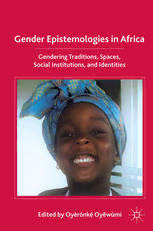
Gender Epistemologies in Africa: Gendering Traditions, Spaces, Social Institutions, and Identities PDF
Preview Gender Epistemologies in Africa: Gendering Traditions, Spaces, Social Institutions, and Identities
Gender Epistemologies in Africa Gender Epistemologies in Africa Gendering Traditions, Spaces, Social Institutions, and Identities Edited by Oyèrónk(cid:2) Oy(cid:3)wùmí GENDER EPISTEMOLOGIES IN AFRICA Copyright © Oyèrónké. Oyeˇwùmí, 2011. Softcover reprint of the hardcover 1st edition 2011 978-0-230-62345-3 All rights reserved. First published in 2011 by PALGRAVE MACMILLAN® in the United States—a division of St. Martin’s Press LLC, 175 Fifth Avenue, New York, NY 10010. Where this book is distributed in the UK, Europe and the rest of the world, this is by Palgrave Macmillan, a division of Macmillan Publishers Limited, registered in England, company number 785998, of Houndmills, Basingstoke, Hampshire RG21 6XS. Palgrave Macmillan is the global academic imprint of the above companies and has companies and representatives throughout the world. Palgrave® and Macmillan® are registered trademarks in the United States, the United Kingdom, Europe and other countries. ISBN 978-1-349-38475-4 ISBN 978-0-230-11627-6 (eBook) DOI 10.1057/9780230116276 Library of Congress Cataloging-in-Publication Data is available from the Library of Congress. A catalogue record of the book is available from the British Library. Design by Newgen Imaging Systems (P) Ltd., Chennai, India. First edition: January 2011 10 9 8 7 6 5 4 3 2 1 For Leymah Gbowee Whose inspirational leadership reminds us that to act is to pray. This page intentionally left blank C O N T E N T S Acknowledgments ix List of Contributors xi Introduction: Gendering 1 Oyèrónk(cid:2) Oyˇewùmí One Decolonizing the Intellectual and the Quotidian: Yorùbá Scholars(hip) and Male Dominance 9 Oyèrónk(cid:2) Oy(cid:3)wùmí Two Gender in Translation: (cid:4)fún (cid:5)etá n Aní wúr à 35 Adé lék è Adé (cid:4)k(cid:5) Three Ode to Patriarchy: The Fine Line between Praise and Criticism in a Popular Senegalese Poem 63 Marame Gueye Four Women and Leadership in Nigerian Islam: The Experience of Alhaja Sheidat Mujidat Adéoyè of Ò(cid:6)ogbo 85 David O. Ogungbile Five Engendering Critical Spatial Literacy: Migrant Asante Women and the Politics of Urban Space 101 Epifania Amoo-Adare Six Outsiders Within: Experiences of Women Academics in Kenya 119 Njoki M. Kamau viii Contents Seven S elf-Image and Self-Naming: A Discursive and Social Analysis of Women’s Microenterprises in Senegal and Mali 155 Marieme S. Lo Eight Irua Ria Atumia and Anticolonial Struggles among the G˜ık(cid:7)y(cid:7) of Kenya: A Counternarrative on “Female Genital Mutilation” 179 Wairim˜u Ngar˜uiya Njambi Nine NAKABUMBA: God Creates Humanity as a Potter Creates a Pot 199 Christine Saidi Ten Beyond Gendercentric Models: Restoring Motherhood to Yorù bá Discourses of Art and Aesthetics 223 Oyèrónk(cid:2) Oy(cid:3)wùmí Index 239 A C K N O W L E D G M E N T S Grateful acknowledgement is made to all the contributors who heeded the call and allowed me to include their papers in this anthology. I received a small grant from the Stonybrook University Fine Arts, Humanities, and Social Science Initiative (FAHSS) which paid for some of the technical aspects of manuscript preparation. Special thanks to Mechthild Nagel, the editor-in-chief of Wagadu: A Journal of Transnational Women’s and Gender Studies, for giving us permission to publish “Engendering Critical Spatial Literacy: Migrant Asante Women and the Politics of Urban Space” by Epifania Amoo- Adare, and to Marta Granatowska of Sage Publications for allowing us to reprint “Irua Ria Atumia and Anticolonial Struggles among the G(cid:8)k(cid:7)y(cid:7) of Kenya: A Counternarrative on ‘Female Genital Mutilation’ ” by Wairim(cid:7) Ngar(cid:7)iya Njambi, which first appeared in Critical Sociology. Thanks are also due to Lauren Pandolfelli, who has been a dedicated research assistant. Finally, I want to thank my friends: Diana Cassells for her unwaver- ing support and contribution at many levels during the process of writ- ing and preparing this anthology; Audrey Gadzekpo, and her daughter Nubuke Amoah, for allowing me to use the photograph on the cover. I hope that this is a book that Nubuke would be proud to stand in front of. We acknowledge the following publications for permission to reprint material: David O. Ogungbile. “Religious Experience and Women Leadership in Nigerian Islam,” JENDA: A Journal of Culture and African Women Studies: Issue 6, 2004. Copyright © 2005 Africa Resource Center, Inc.
